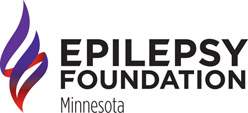To support the high quality programs and services of the Epilepsy Foundation of Minnesota (EFMN), the Foundation relies on contributions from individuals, foundations, and corporations. Approximately 50% of EFMN’s base support is raised through these channels. Due to our high regards for our donors and a mutual respect for the Foundation’s mission, we have created a Donor Privacy Policy to ensure that all donors’ personal and financial information is protected. All gift transactions (online, mail, phone) with the Foundation are covered by this policy and are conducted over secure portals. Access to this data is password-protected and limited to authorized EFMN employees.
Donor Information
EFMN collects and maintains the following types of donor information:
- Contact information, such as: name, address, telephone number, email address
- Giving information
- Information on event/program participation and resource request
- Information provided by the donor in the form of comments and suggestions
This confidential information is kept in a secure database and is on maintained to comply with 501(c)(3) and IRS regulations in addition to specific grant reporting requirements. It is also used to track and analyze donor data and to inform donors about upcoming events, activities, giving opportunities, and gift acknowledgments, and to provide tax-receipts for gifts. Select information is shared with appropriate staff, board members, volunteers and consultants only on a confidential and need-to-know basis.
List Sharing
EFMN does not sell, rent, trade, or share its donor list with any other organizations. In addition, it does not send out mailings on behalf of other organizations.
Discontinuing Contact Upon Request
It is the policy of EFMN to communicate with donors according to their expressed preferences whenever possible. EFMN will discontinue or change the method used to contact any person upon that person’s oral or written request directed to the organization, its development staff, or another agent.
EFMN shall maintain a record of all requests by persons who indicate to the Foundation, its professional fundraiser, or other agents, that they do not wish to be contacted by or on behalf of the Epilepsy Foundation of Minnesota.
This policy does not prohibit contact by an individual or group voluntarily soliciting on behalf of the Epilepsy Foundation of Minnesota, even if the person being contacted has requested to be placed on the “do not contact list”.
Upon a person’s (or a person’s authorized representative’s) request that the Epilepsy Foundation of Minnesota discontinue further contacts, the person’s name and address will be promptly modified in EFMN’s donor database to ensure that no further contact is made with the person.
Permanent Record: EFMN will maintain an electronic record of requests for discontinuance of contacts, effective with the adoption of this policy. Oral requests will be noted in writing by EFMN staff and permanently recorded in the electronic donor database. The records of persons who have made such a request will be maintained by EFMN to the extent necessary.
Donor Bill of Rights
EFMN subscribes to the Donor Bill of Rights, which was created by the Association of Fundraising Professionals (AFP), the Association for Healthcare Philanthropy (AHP), the Council for Advancement and Support of Education (CASE), and the Giving Institute: Leading Consultants to Non-Profits.
The Donor Bill of Rights
Philanthropy is based on voluntary action for the common good. It is a tradition of giving and sharing that is primary to the quality of life. To ensure that philanthropy merits the respect and trust of the general public, and that donors and prospective donors can have full confidence in the nonprofit organizations and causes they are asked to support, we declare that all donors have these rights:
I. To be informed of the organization’s mission, of the way the organization intends to use donated resources, and of its capacity to use donations effectively for their intended purposes.
II. To be informed of the identity of those serving on the organization’s governing board, and to expect the board to exercise prudent judgment in its stewardship responsibilities.
III. To have access to the organization’s most recent financial statements.
IV. To be assured their gifts will be used for the purposes for which they were given.
V. To receive appropriate acknowledgment and recognition.
VI. To be assured that information about their donation is handled with respect and with confidentiality to the extent provided by law.
VII. To expect that all relationships with individuals representing organizations of interest to the donor will be professional in nature.
VIII. To be informed whether those seeking donations are volunteers, employees of the organization or hired solicitors.
IX. To have the opportunity for their names to be deleted from mailing lists that an organization may intend to share
X. To feel free to ask questions when making a donation and to receive prompt, truthful and forthright answers.
Updated November 2012
